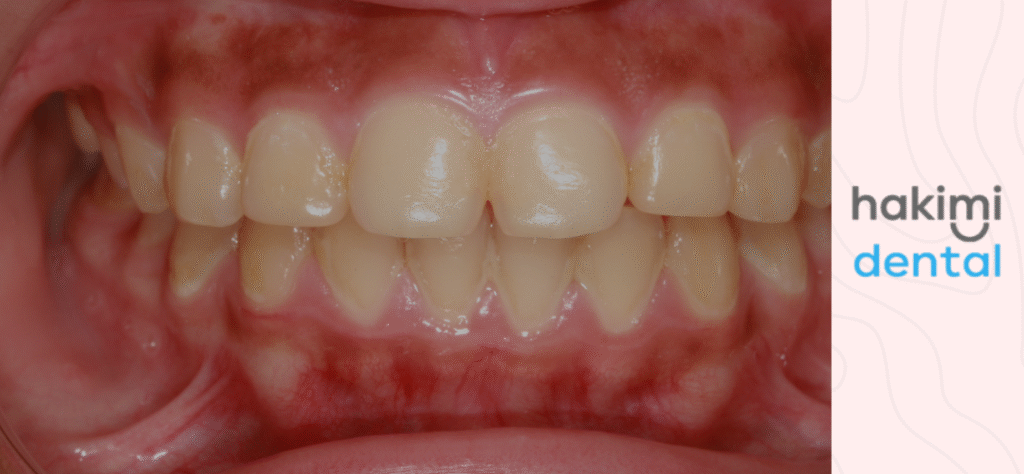Gingivitis is one of the most common dental problems people experience – yet many don’t realise they have it until it becomes more serious. The good news? It’s preventable and treatable with the right care and support.
At Hakimi Dental Clinic, we help patients across Oldbury maintain healthy gums and avoid the complications that come from untreated gum disease. In this guide, we’ll explain what gingivitis is, how gingivitis treatment works, and what you can do to keep your mouth healthy long term.

What is gingivitis?
Gingivitis is the early stage of gum disease. It causes inflammation of the gums, usually due to a build-up of plaque – the soft, sticky film of bacteria that forms on your teeth.
Common signs of gingivitis include:
- Red or swollen gums
- Bleeding when brushing or flossing
- Bad breath that doesn’t go away
- Tender gums or slight discomfort
If left untreated, gingivitis can progress to periodontitis, which can lead to gum recession, loose teeth, or even tooth loss.
Learn more from NHS guidance on gum disease and the Cleveland Clinic’s overview of gingivitis and periodontal disease.
What causes gingivitis?
The most common cause of gingivitis is poor oral hygiene. When plaque isn’t removed through daily brushing and flossing, it hardens into tartar, which irritates the gums.
Other risk factors include:
- Smoking
- Diabetes
- Certain medications
- Hormonal changes (e.g., during pregnancy)
- A weakened immune system
You can read more on the background of the condition from Wikipedia’s gingivitis page.
Why you shouldn’t ignore gingivitis
One of the reasons gingivitis is often ignored is because it doesn’t usually cause pain in the early stages. But don’t let that fool you. Left untreated, it can quickly turn into a more serious problem that affects your oral and general health.
At Hakimi Dental Clinic, we regularly see patients who only come in once their gums are bleeding or their teeth feel loose – but the earlier we catch gingivitis, the easier it is to treat.
How gingivitis treatment works
Gingivitis treatment usually involves a combination of professional cleaning and improved at-home care. Here’s what you can expect:
1. Professional cleaning
Our dental hygienists remove plaque and tartar from your teeth and gums during a thorough scale and polish. This is one of the most effective ways to reverse gingivitis.
You can book a hygienist appointment with us here:
2. Ongoing oral hygiene advice
We’ll help you build a routine that works, including brushing technique, flossing tips, and product recommendations.
3. Regular dental check-ups
Early signs of gingivitis can be picked up during routine check-ups, helping prevent long-term damage.
Find out more about check-ups here:
Prevention: the best gingivitis treatment
The best way to treat gingivitis is to prevent it altogether. Here are five key habits that protect your gums:
- Brush twice daily with fluoride toothpaste
- Floss or use interdental brushes once a day
- Visit your dentist regularly
- Don’t smoke – it increases your risk of gum disease
- See a hygienist for professional cleaning every 6 months
If you’re overdue for a visit or concerned about your gums, book an appointment today:
Why choose Hakimi Dental Clinic for gingivitis treatment?
- Friendly, experienced dental team with years of patient care in Oldbury
- Gentle and effective cleanings tailored to sensitive gums
- Focus on prevention and long-term oral health
- Trusted by families and individuals across the area
We combine modern technology with a caring approach to make sure you feel comfortable and confident during your visit.
Ready to treat gingivitis?
If your gums are bleeding, feel swollen, or something just doesn’t feel right – don’t wait. The earlier you start gingivitis treatment, the easier it is to reverse and control.
Your gums are just as important as your teeth. Let’s take care of both.
FAQs about gingivitis
Yes, gingivitis is completely reversible with early treatment and proper oral care. Regular cleanings and better hygiene usually do the trick.
Good oral hygiene at home can help, but once tartar has built up, you’ll need a professional cleaning to remove it.
Not if it’s treated early. If ignored, it can progress to periodontitis, which may result in tooth loss.
Most people see improvement within a few days to weeks after cleaning and adopting a better routine.
Most treatments are pain-free. If your gums are very sensitive, we’ll make sure you’re as comfortable as possible during your visit.
